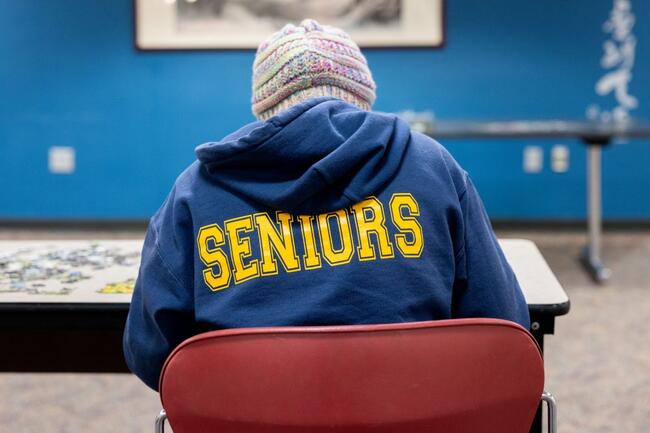You have /5 articles left.
Sign up for a free account or log in.

The Class of 2026 worries about their job prospects after graduation.
Allison Shelley/Complete College Photo Library
In the face of an economic downturn and a competitive job market, a majority of the Class of 2026 say they’re pessimistic about starting their careers, according to a new survey from Handshake.
Nearly one in five bachelor’s degree seekers said they’re very pessimistic about their next chapter; an additional 42 percent said they’re somewhat pessimistic. The top reasons students cite for their lack of enthusiasm are high competition for jobs, a shortage of available positions and concerns about job security. About half of respondents said generative artificial intelligence is one reason they’re not optimistic about their future careers.
The students’ fears are validated by site data from Handshake; the report identified a 16 percent year-over-year decline in job postings and a 26 percent increase in applications per job.
“The political climate has made me lose a lot of hope for not only the job market, but my future as a whole,” wrote one student, a product design major graduating next spring. “Everything feels very divided and unstable.”
Methodology
Handshake’s Class of 2026 fall report includes responses from 2,440 bachelor’s degree–seeking students in their senior year, representing 641 unique institutions. Handshake also surveyed 1,042 hiring managers from a variety of industries. The survey was conducted in July 2025.
AI in the spotlight: Handshake’s survey also points to a growing focus on tech skills, particularly concerning generative AI, for early-career professionals.
More than 80 percent of rising seniors have used generative AI tools, on par with their peers who graduated in 2025. Twenty-four percent say they use generative AI on a daily basis, a slight decrease from the Class of 2025 (27 percent) but significantly higher than their 2024 peers (13 percent).
Among students using generative AI tools, a majority said they use them for brainstorming (74 percent) or for self-teaching (68 percent). Half of generative AI users employ the tools for written communication, while half of all students say they avoid using generative AI for written communication because “I think It’s important I do this myself,” according to the report.
When hiring managers consider the future, more than half think generative AI will create jobs; only 24 percent of rising seniors believe the same. However, 46 percent of student respondents said they’re glad generative AI tools exist, and 40 percent believe the tools will improve productivity in their careers. A previous study by Gallup found that half of young people agree AI will help them learn faster, making it easier to complete their work.
According to Handshake’s data, AI-exposed careers—those that are more susceptible to reassigning tasks typically given to personnel to tech tools—are not declining at a faster rate than other jobs, which the report authors said indicates AI is not the only factor influencing the early-talent job market.
In addition, the report found a greater number of job postings reference generative AI chat bot skills compared to years prior; tech and marketing fields are especially likely to mention ChatGPT, Midjourney, Claude, Gemini, Copilot or prompt engineering in their posts. More than 80 percent of hiring managers say it’s somewhat or very important that entry-level hires are comfortable using AI for research, brainstorming or written communication, among other skills.
Handshake’s findings were affirmed by a recent survey from Nexford University, an online graduate-level institution, which found that 26 percent of hiring managers say AI fluency is a baseline requirement for applicants.



